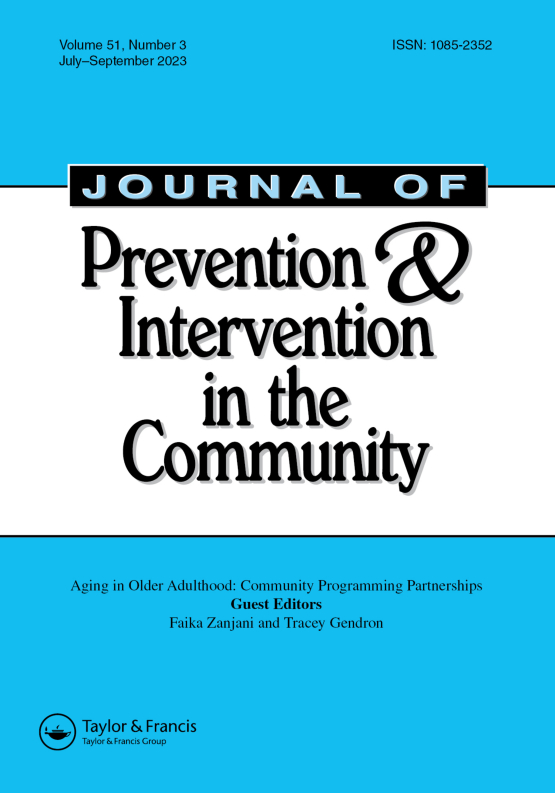Submit a Manuscript to the Journal
Journal of Prevention & Intervention in the Community
For a Special Issue on
Positive Psychology Concepts in Community Psychology
Abstract deadline
15 July 2024
Manuscript deadline
31 October 2024

Special Issue Editor(s)
Roger N. Reeb, PhD,
University of Dayton
[email protected]
Nyssa L. Snow-Hill, PhD,
DePaul University
[email protected]
Positive Psychology Concepts in Community Psychology
The Journal of Prevention & Intervention in the Community (JPIC) invites you to submit an abstract for consideration in a special issue on “Positive Psychology Concepts in Community Psychology.” JPIC, in print since 1995, provides professionals with up-to-date information on effective programs for community intervention and prevention. With an emphasis on mental health and human services, JPIC is of interest to community researchers, healthcare and helping professionals considering new approaches to service delivery and community practice, clinical supervisors, education specialists, and administrators in human services.
Seligman and Csikszentmihalyi (2000) introduced positive psychology to address the following criticism regarding the discipline of psychology: “The exclusive focus on pathology that has dominated so much of our discipline results in a model of the human being lacking the positive features that make life worth living” (p. 5). Positive psychology may be defined as the scientific study of human flourishing at multiple levels, including personal dimensions (psychological, biological, relational) and broader ecological (e.g., family, community, institutional) and global dimensions. Examples of concepts affiliated with the expanding domain of positive psychology include: wellness, quality of life, flourishing, positive prevention, hope and optimism, resiliency, recovery, mindfulness, capacity for love and vocation, courage, meaning/purpose in life, wisdom, interpersonal skill, human agency, healthy coping, flow, awe, compassion, self-reflection, positive communities and institutions, social responsibility, social justice, and tolerance.
Positive psychological interventions have efficacy in improving wellbeing (meta-analysis by Sin & Lyubomirsky, 2009), and while most of this work has focused on the individual, even the first formal statement of positive psychology (Seligman & Csikszentmihalyi, 2000) emphasized that “people and experiences are embedded in a social context” (p. 8), highlighted the notion of “collective wellbeing” (p. 12), and recommended “a social science of positive community and positive institutions” (p. 12). More recently, authors have called for an integration of positive psychology and community psychology (e.g., Ronen & Kerret, 2020), e.g., a positive community psychology (Marujo & Neto, 2014; Montiel et al., 2021; Schueller, 2009), a collaborative positive psychology (Hogan, 2020), and a sustainable collective wellbeing (Ronen & Kerret, 2020). But these authors acknowledge “the bridges that need to be constructed…[to steadily build]…a new hybrid full of potential” (Marujo & Neto. 2014, p. 209) as well as a need for more inclusiveness in positive psychology (Rao & Donaldson, 2015; see a critique of positive psychology by Yakushko & Blodgett, 2021). Further, while noting the value of enhancing wellbeing at the individual level, these authors emphasize the following: the potential far-reaching benefits of combining positive psychology interventions with strategies to address structural (sociopolitical) factors (e.g., unequal distribution of resources, discrimination), the need to improve access to positive psychology interventions among vulnerable (underserved) populations, and the potential of positive psychology for environmental sustainability initiatives.
Looking to Publish your Research?
Find out how to publish your research open access with Taylor & Francis Group.
Choose open accessSubmission Instructions
We are soliciting manuscripts that present original empirical community-based research (quantitative, qualitative, or mixed methods) that apply positive psychology concepts in prevention, intervention, and/or assessment in the community, while reflecting the values of inclusiveness, consideration of sociopolitical context, and access for vulnerable populations.
As a first step, we invite one-to-two-page proposals summarizing a pertinent research project. Submit proposals as MS Word documents to [email protected] and [email protected] (type “JPIC Special Issue” in subject line) by May 15, 2024. Authors of selected proposals will be notified by June 15, 2024. Full manuscripts to be considered for the special issue are due by September 15, 2024. Manuscripts are screened by Guest Editors, and manuscripts that meet guidelines undergo rigorous blind review by two anonymous referees. For questions about the special issue, contact Guest Co-Editors: Roger N. Reeb, PhD ([email protected]) and Nyssa Snow-Hill PhD ([email protected]). Direct all inquiries about JPIC to Editor-in-Chief Judah Viola, PhD ([email protected]).